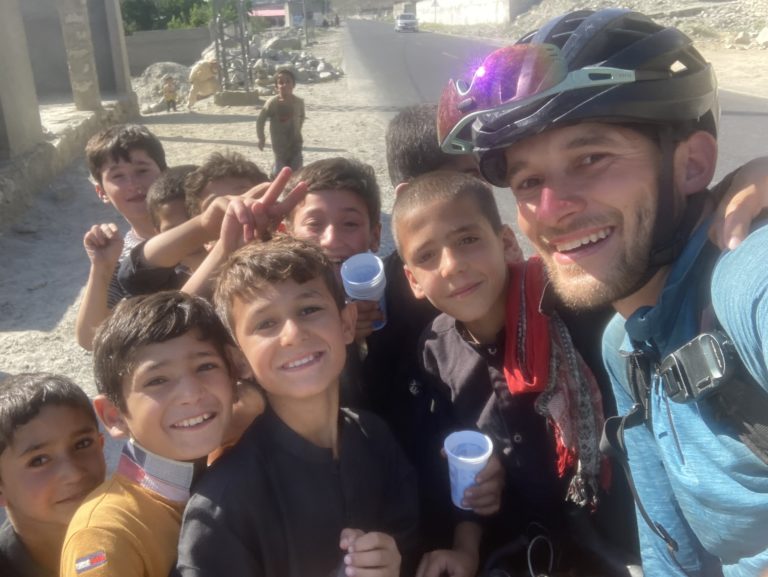Cycling to the end of the world - Life lessons
Autor: Florian Berg
Admittedly, the headline sounds a little crazy. And in fact, ‘You are crazy!’ is one of the phrases I hear almost every day. To the end of the world – where is that? It depends on your perspective. My home is Bürvenich, a village of a thousand souls in the Voreifel region. Today, I am in Pinedale, a town twice as big in the US state of Wyoming – near Yellowstone National Park. How did I get here? By bicycle. Via a ‘small’ detour of 34 thousand kilometres, four continents and the greatest adventure of my life. How does one become so crazy as to want to cycle around the world? I think it was a happy coincidence of circumstances. I am a scientist, driven by curiosity – and the stress of my chemistry studies led me to get on my bike in 2018. My first tour from Jülich to Berlin was anything but comfortable due to my inexperience. Nevertheless, I fell head over heels in love with this form of travel. On my second tour through Scandinavia, I sat by a lake in Sweden and asked myself: ‘How far can you ride? Can you circumnavigate the planet?’ This idea quickly became my lifelong dream. After eight more bike tours with a maximum tour length of 28 days, a completed degree and now over 15 months on the bike, I can say: yes, you can, and it’s amazing how far two wheels, courage and curiosity can take you.
On 3 March 2024, I set off from my home village. First, I travelled across familiar Germany to Munich, then over the Austrian Alps to Italy, through Slovenia, the Balkans and Greece to Turkey – Istanbul: the gateway to Asia. This was followed by Georgia, Kazakhstan, the Uzbek desert, the Pamir Mountains in Tajikistan, where I conquered the 4,655-metre-high Ak-Baital Pass with fellow cyclists. Then on through lush green Kyrgyzstan, strange China, an unplanned extended stay in Pakistan with stories so absurd that hardly anyone believes me. Then India with my favourite food, poverty-stricken Nepal, Vietnam, Laos, Cambodia, Thailand, Malaysia, Singapore – 27 countries make up the first major chapter of my journey – Eurasia. Oceania, part two, begins with a 3,000 km crossing of Australia’s scorching hot outback in midsummer, then along the east coast via Sydney, Canberra and Melbourne to Tasmania, followed by beautiful mountainous New Zealand. And now I find myself in the third chapter, having conquered the wilderness of Alaska and Canada with their grizzly bears and currently heading along the Rocky Mountains in the USA towards Mexico.
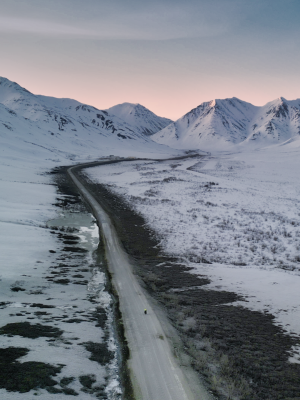
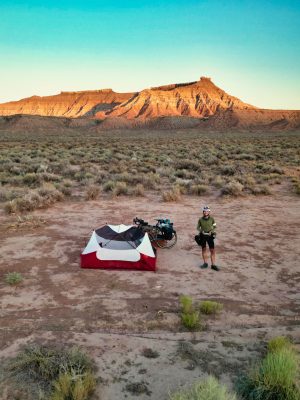
I’ve experienced pretty much everything: deserts, tropics, Arctic tundra. Temperatures between -18 °C and +46 °C. I know what real hunger feels like – and real thirst. But why do all this by bike? Because it means freedom. I sleep in a tent 99% of the time and cook my own food, which makes travelling extremely cheap. A month on my bike costs less than my rent in Germany. The biggest expenses are visas and flights to cross the oceans and, of course, my fuel – food. I don’t ride an e-bike – that would be neither practical nor rechargeable in remote regions. Everything is done under my own steam – a feeling that is infinitely liberating. And freedom is the key word. The bike takes me to places that are inaccessible by other means of transport. Unlike classic backpacking, I deliberately avoid the hotspots and see countries and cultures as they really are. Authentic. Raw. Life-changing. The bicycle is the poor man’s mode of transport – and in the poorest countries in the world, people recognise themselves in me. This connection overcomes any language barrier. Yes, of course it’s hard work and not a relaxing holiday. I cycle five to ten hours a day through wind, cold, snow, rain, heat and wilderness, sometimes for days without internet – with my ‘home’ on two wheels. But that’s exactly what makes it so appealing. I am not proud of the number of kilometres I have covered, but rather that I push myself every day, leave my comfort zone – and surpass myself.
I am certainly no pioneer. Many have done it before me, and I take my hat off to every cycle tourist for their courage and perseverance. But what makes my journey special is that in two and a half years, I will have crossed six continents. Most people cycle to Singapore or Cape Town, some along the Pan-American Highway – and end their tour there. But there are only a handful of people who attempt to do everything at once. I am grateful for that. This journey is a privilege – and the most precious chapter of my life. I have learned more about life than I did in my entire school career. Everything I have experienced in 15 months so far and all the crazy stories and encounters I have had cannot be adequately described in a newspaper article – they will be part of a book later on. But I would like to share some of the most important lessons here.
But why all this? Why do I voluntarily enter a world that seems so dark and dangerous? This is lesson 1: the world is friendlier than we think. In Asia, I have experienced a level of hospitality that many people in Germany cannot even imagine. The media paints a distorted picture of our world. No one clicks on a headline like: ‘No war in Bürvenich today’. Instead, conflicts, crises and fear dominate. But out there – in the mountains of the Himalayas, on the dirt roads of Southeast Asia, in the steppes of Central Asia – I have experienced something else: humanity. Warmth. Unconditional helpfulness. People who treat strangers like friends and the poorest people who share their last meal with someone they have just met on the street.
I experienced a scene that illustrates this on my way from Islamabad to Lahore in Pakistan. In a country where most people are Muslim, hospitality is not just a word, but a living culture. On some days, I was invited up to 200 times and given food and drink – even when I had already been taken care of. And that was exactly the case on this particular day: I had everything I needed and just wanted to get to my sleeping place. And yet – an elderly gentleman on a moped pulled up alongside me on the motorway and insisted on buying me a bottle of water. I tried to politely decline, but it was futile. So I followed him to the nearest petrol station. There he asked me to repeat a few sentences in Hindi. I had no idea what I was saying – but I obediently repeated everything. Ten minutes later, the whole petrol station shop was applauding, people were laughing, hugging me, and I was completely confused until I understood: I had apparently just converted to Islam. Unconsciously and without intention. But everyone agreed: this had to be celebrated. The elderly gentleman said that water was no longer enough. So he grabbed some bread – and because dry bread is not enough, he added a jar of Nutella. I tried to politely decline, but he would not be dissuaded. He emptied his entire wallet onto the counter. It was not enough. The rest was on the house. A day later, I opened the jar of Nutella. It was mouldy – it had probably been sitting on the shelf for years or decades because no one could afford to buy it. And yet, I had been given it as a gift. Not because I needed anything, but because I was there. Because I was welcome.
In many cultures, ‘we’ counts more than “I”. We in Germany could learn a thing or two from this, and if everyone were to have just one of these experiences, no one would call for the country’s borders to be closed anymore. Instead, everyone would be welcomed with a smile and a ‘welcome’, as I experienced everywhere I went.
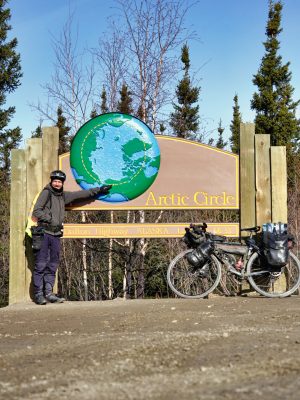
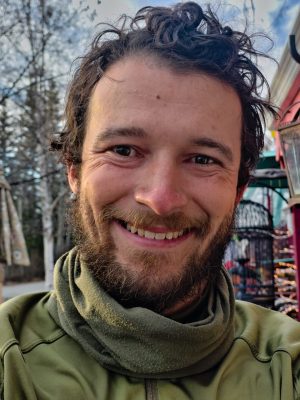
One of the main reasons for my trip was to see with my own eyes where climate change is already having an impact. And this is the next lesson: climate change is not some distant storm on the horizon, it is already here and affects us all, even in Germany. I have seen how people in the most inhospitable regions of the world are leaving their homes because it is getting too hot. Glaciers are melting. Soils are drying up. Fields no longer yield crops. Forests are burning. Ecosystems such as coral reefs are dying. Flash floods and extreme weather events are devastating entire regions. I myself narrowly escaped four environmental disasters. In Germany, we have insurance, reserves and prospects. People in Nepal, for example, are losing everything – and they are the least responsible. Our prosperity in industrialised countries is not ‘earned’. We were born into it and are exceeding the planetary limits of our finite resources. The major levers lie with industry and politics, which must set the framework conditions – but which, unfortunately, currently have little interest in climate protection. But change also begins with each individual. Because the sum of millions of small contributions ultimately adds up to something significant. However, this requires self-reflection and change. Change does not automatically mean sacrifice. Using a bicycle instead of a car has health benefits, and meat does not have to be on the table every day. This world is so complex that even with all the scientific studies that have been conducted, it cannot be fully understood. But people want simple explanations and solutions, which are gladly ‘delivered’ by parties such as the AFD, which still denies climate change to this day. Simply continuing to live as before is the easiest option. Instead, foreigners are generalised and immigration is made more difficult. Imagine how many millions, indeed billions, of people will have to leave their homes in a few decades because they can no longer live in their own countries due to climate change. This is not fiction, but already reality, and the supposedly ‘simple’ solutions only exacerbate the situation. We should welcome every single person who has to leave their home because of us and take responsibility for our way of life.
I spent over a year planning this trip – and yet most things turn out differently than expected. Because life doesn’t stick to routes or schedules. Surprises make life exciting, even if they are challenging. But sometimes everything falls apart. Sometimes it gets lonely, hard or scary. But it is precisely in these moments that you learn what you are capable of. That a change of perspective can often be helpful and that almost everything can be solved – even if it takes patience, openness, creativity and time. The best stories often begin where the plan ends.
Gratitude is hidden in simple things. I have learned how little we actually need to live and how much we actually have. Everything I need for 2.5 years fits into 6 bags attached to my bicycle. Water, food, a roof over my head, a bed, sanitary facilities, electricity, education – for many of us, these things are simply taken for granted. But are they? For the majority of the world’s population, they are a luxury – precious. Perhaps we should pause more often and simply say ‘thank you’.
We should not take water for granted. Water is life. Anyone who drives through the Australian outback in 40 °C heat with 19 litres of water in their luggage and discovers that only two of the eight planned water stops exist learns that every drop counts. And the same applies to love. If you have water and love, you have everything.
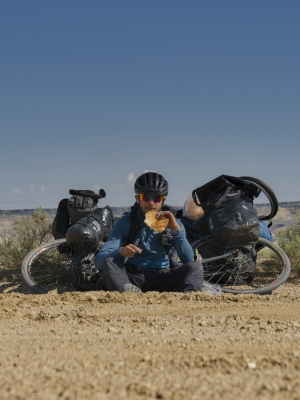
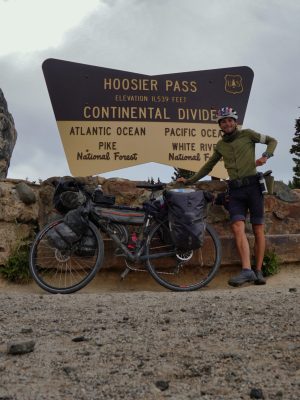
And last but not least: tomorrow is not guaranteed. Life is fragile and finite. If you have a dream and can somehow make it come true, don’t wait until tomorrow. The best time is rarely later. The best time is now. Many talk. Few act. But change only comes through action. Comfort zones are convenient, but they are not places for development. Those who venture into the unknown grow – always.
This planet is unique. The fact that we have life on Earth is a miracle, and our basis for life is infinitely precious and worth protecting. I am grateful that I will be able to discover and experience Central America, South America and part of Africa over the next 15 months before returning home from Spain, hopefully having inspired a few people along the way. I have big plans for the future. If you would like to find out more, I am sharing my journey on Instagram at @bluemiracle_official – and I welcome any messages, thoughts or questions.
Until then: stay curious. Stay open-minded. Stay human.
PS: And if you’re still wondering what happens more often on a trip like this – religious conversion or flat tyres? I can say that converting to Islam was a one-off. Unfortunately, the flat tyres weren’t – but you can count them on two hands, if you exclude the one day in Pakistan when I had nine flat tyres.
Cheers, Florian
